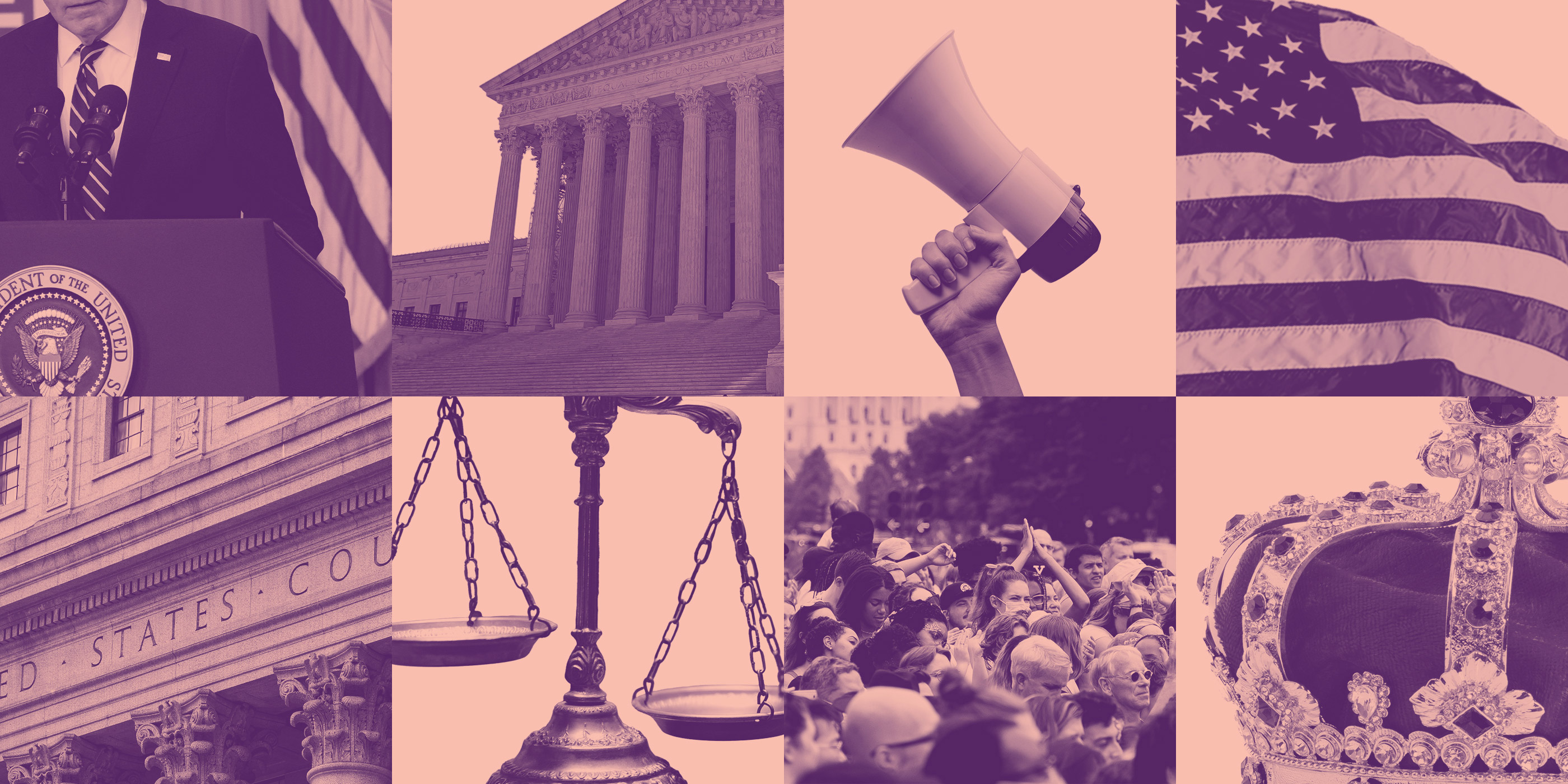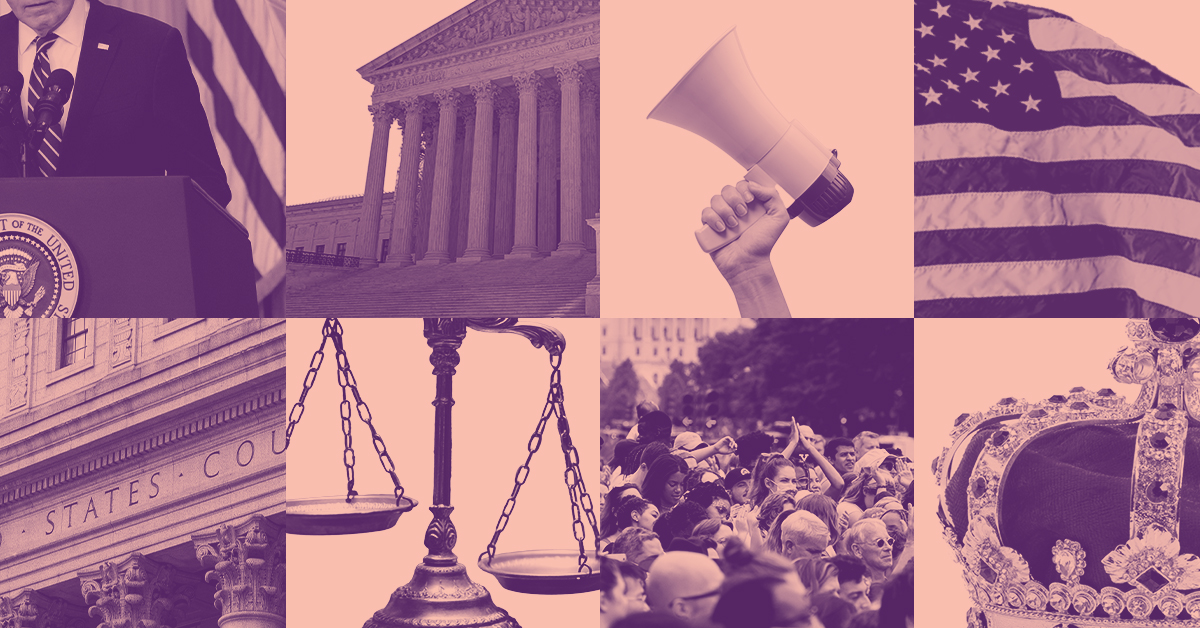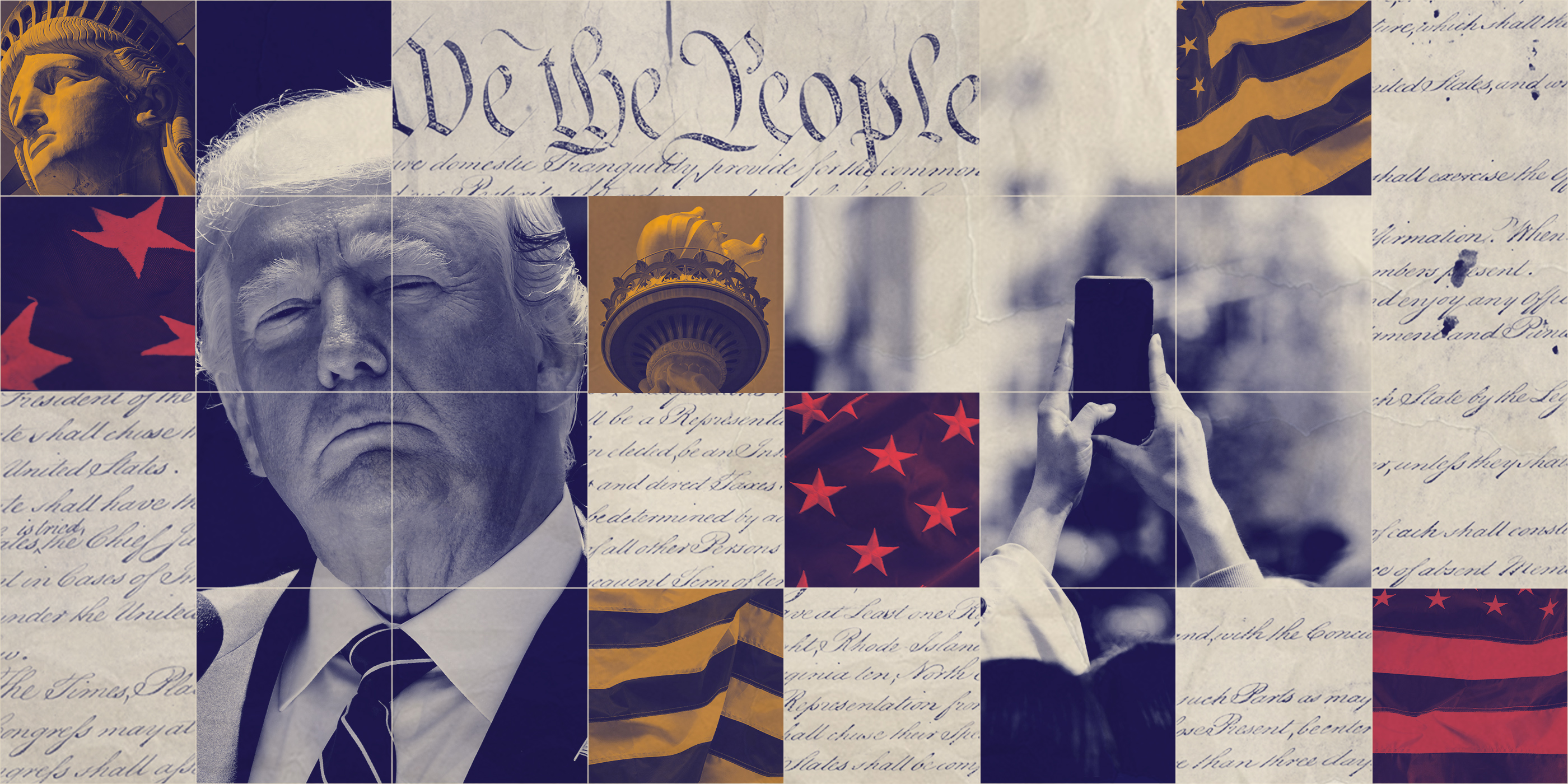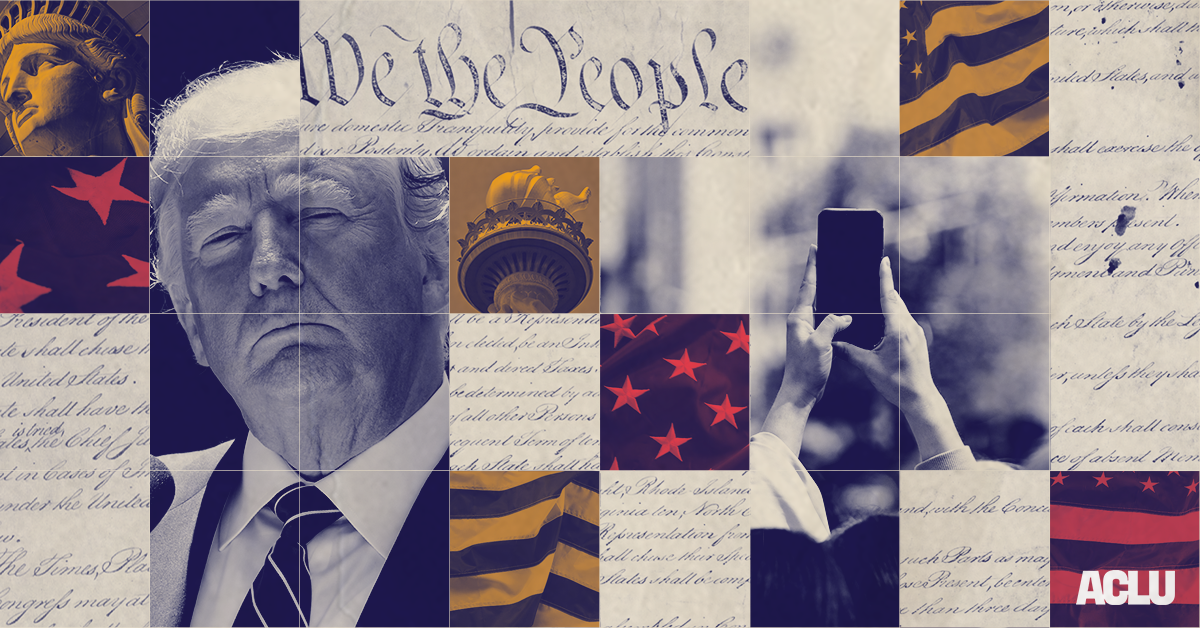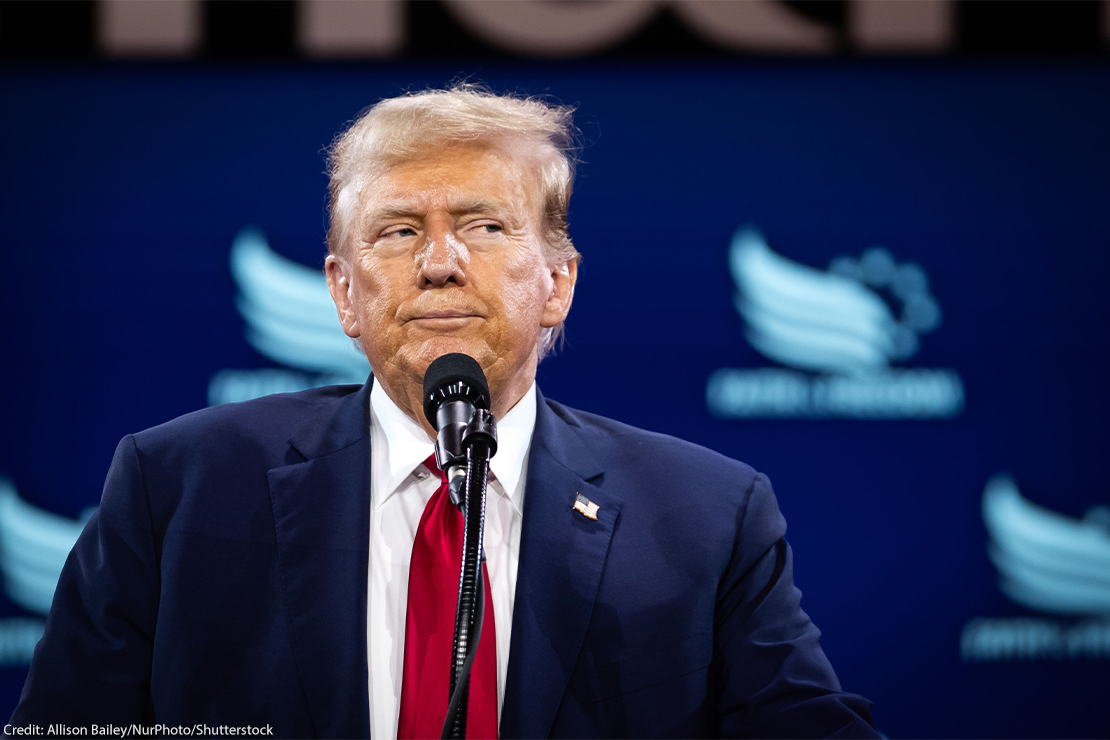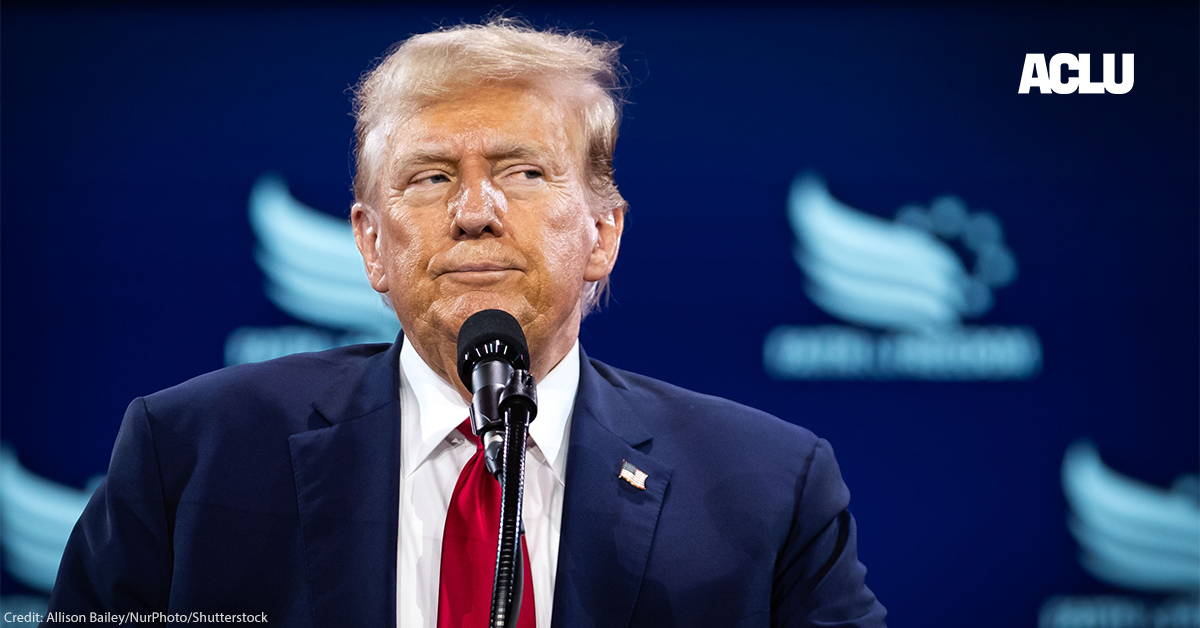Donald Trump’s four years in office were marked by gross abuses of executive power, including efforts to trample protest and dissent — key freedoms at the heart of our participatory democracy.
He deployed federal agents and surveillance to silence Black Lives Matter protesters or anyone he deemed to oppose his policies, threatened to use his power as president to punish his political enemies, and attacked journalists who criticized him. If elected to a second term, we expect the Trump administration to double down on attempts to further limit our First Amendment rights and use the power of the federal government to attack political rivals, stifle dissent, and undermine checks and balances on presidential power.
For more than 100 years, the ACLU has defended our most fundamental rights and freedoms — including our right to express ourselves free from government interference. We won’t stop now. If Trump is reelected, we’re prepared to use the courts, Congress, state and local power, and our organizing muscle to challenge unlawful attempts to surveil Americans, suppress speech, and undermine democracy. Learn more in our breakdown:
Trump on Surveillance, Protest, & Free Speech
The Facts: In 2020, the Trump administration threatened to use force to quell protests, and actually did deploy federal agents and National Guard troops who arrested and used excessive force against protestors and journalists. If Trump secures a second term, this abuse of power is likely to recur and even escalate. Trump has already indicated that his administration would consider invoking the Insurrection Act to deploy the military to America’s cities — potentially targeting those with large BIPOC and immigrant communities — to suppress the right to protest. Trump has also indicated that his administration would attack online free expression by forcing media companies and online platforms to carry conservatives’ preferred speech.
As president, with federal law enforcement agencies under his control, Trump could carry out attacks on advocacy organizations and individuals he opposes. Indeed, on the campaign trail, Trump has praised violent crackdowns on campus protests, aligning with his previous attacks on academic freedom. In particular, he has threatened to deport student protestors who are not U.S. citizens, merging his attacks on free speech with his attacks on immigration. We also expect Trump to use his authority to further target media members and the freedom of the press to suppress negative stories about him or his administration.
Furthermore, Project 2025 has made clear that a second Trump administration intends to dismantle the already insufficient guardrails that prevent the president from abusing the executive branch’s power. The Supreme Court already removed one such guardrail in Trump v. United States, ruling that the president cannot be criminally prosecuted for “official acts,” including using the Justice Department for his personal and political bidding. Trump can use a politicized Justice Department and the vast array of federal agencies to attack voters, protestors, journalists, abortion care providers and patients, his political opponents and any others he perceives as “enemies.” Even now, Trump allies in Congress are trying to use their investigative tools to chill free speech, including targeting civil society organizations and activists engaged in protected advocacy, such as opposing the war in Gaza or supporting LGBTQ rights.
The dangers of the federal government targeting its opponents and vulnerable populations are multiplied by mass surveillance mechanisms that the ACLU has long fought to constrain. A second Trump administration could leverage surveillance programs such as Section 702 of the Foreign Intelligence Surveillance Act (FISA), which authorizes the collection of communications between U.S. persons and people outside the United States, and which Congress has dangerously expanded to allow the government to search Americans’ private communications and information without a warrant and without notice.
Why It Matters: By punishing political enemies and stifling protest and dissent, a second Trump administration would break many of the checks and balances on the executive branch, and undermine the foundations of a functioning democracy. A second Trump administration will also pose a threat to our historic American tradition of robust, open political competition marked by spirited dissent and the foundational notion that the people have the final say.
How We Got Here: Early in his presidency, Trump sent National Guard troops to stop Black Lives Matter protesters in Washington, D.C., threatened to deploy the military more broadly to quell protests in other U.S. cities, and sent federal law enforcement agents around the country to break up protests by force, including arresting protestors and journalists.
Trump has also already shown how he will target his perceived enemies, whether they be political rivals, media members, or everyday citizens. He's promised prosecution or harm towards President Biden and Biden administration officials, poll workers, former military generals, former officials in his own administration who fell out of favor, protesters, journalists, migrant or immigrant communities, and many others.
Additionally, when it comes to surveilling Americans, there is already a history of law enforcement and intelligence agencies’ abuse of surveillance programs that give the government the right to collect private information from American citizens. It is all too easy to foresee a second Trump administration using these overbroad and dangerous spying powers to surveil and discriminate against political opponents and people and communities already in its crosshairs. Protesters, communities of color, immigrants, and people seeking abortions or gender-affirming care all face even greater risks to their privacy and rights.
Our Roadmap: The ACLU will always rise to defend protesters, journalists, and others who are subjected to abusive criminal prosecutions or other punitive actions from the government. To combat a second Trump administration’s intention to trample historical checks and balances, and the apparent willingness of many within and outside of government to help, we will work with allies to urge the American people to exercise their First Amendment rights — like the right to protest — so that Trump’s excesses are met with the direct power of the people. And, if a second Trump administration does misuse executive authority, the ACLU will go to court to stop efforts to breach Americans’ privacy, discriminate based on race or ethnicity, or retaliate against dissenters or seek to silence them.
Should a Trump administration again deploy the military and federal agents to quell peaceful protests and interfere with journalists reporting on protests, the ACLU and its affiliates network will be on the ground fighting to protect our rights. As we did during Trump’s first presidency, we will bring lawsuits on behalf of protesters and the media addressing any speech or due process-related violations as outlined in the First and Fourth Amendments.
Importantly, we will urge state and local leaders who value civil liberties to lead efforts to resist abuses of federal executive power and limit the reach of the federal government’s power within their jurisdictions. For instance, states can limit — or eliminate — cooperation agreements between state and local law enforcement and federal law enforcement to minimize the grounds federal authorities can intervene in protests. They can also prevent voluntary data sharing that could be used for federal surveillance purposes or to support politically motivated investigations and prosecutions.
The ACLU also works with a bipartisan coalition of civil libertarians on Capitol Hill who recognize the danger of overly broad executive power. To protect our free press, we’re already working to urge Congress to enact the Protect Reporters from Exploitative State Spying Act (PRESS Act), which would prevent the federal government from compelling journalists to reveal their sources and work product. We’re also calling on our elected leaders to install stronger guardrails against political influence over the Justice Department. Lastly, we’re pushing policymakers to limit government surveillance and protect Americans’ private communications from unlawful collection by passing the Fourth Amendment Is Not For Sale Act.
What Our Experts Say: “Donald Trump has made no secret of his disregard for the rule of law and his intent to corrupt the immense powers of the federal government to target his opponents and break the institutions that could pose checks and balances to presidential power. In a second term, unleashed and feeling invulnerable from legal and political repercussions, he would pose an unprecedented challenge to our constitutional values. But the ACLU is ready.” — Mike Zamore, national director of policy and government affairs
“The ACLU has always worked to stop the executive branch from abusing its power at the expense of individual freedom and vulnerable communities. The Trump presidency, with its false declarations of national emergencies in service of discrimination and total disregard for the rule of law, demonstrated what we’ve always known – that relying on unwritten norms for presidential behavior is grossly insufficient. If there is a second Trump administration, we are prepared to defend people it attacks, including protestors, dissenters, and journalists.” — Cecillia Wang, deputy legal director of the ACLU
What You Can Do Today: The ACLU has long advocated for robust legislation that safeguards against all kinds of government overreach, including the unlawful warrantless surveillance of our private communications. Show your support by calling your representative to support the Fourth Amendment is Not for Sale Act now.
https://www.aclu.org/news/civil-liberties/how-trumps-proposed-radical-expansion-of-executive-power-will-impact-our-freedoms
A second Trump administration threatens to use executive authority to further limit First Amendment freedoms, surveil Americans and undermine democracy.
